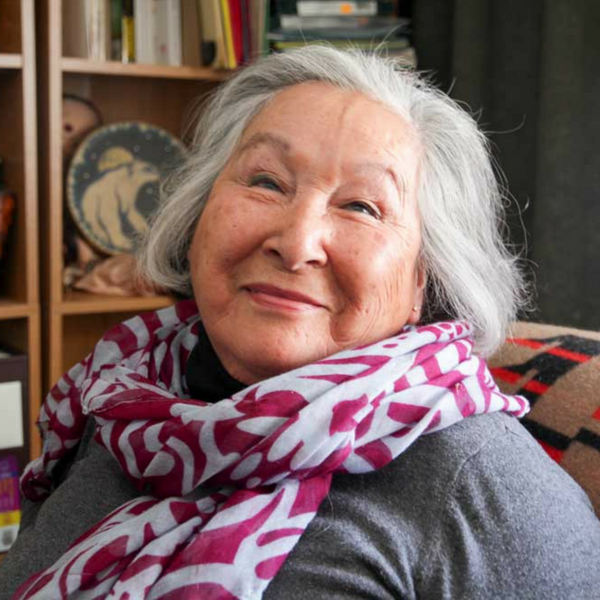Sign up to take the first challenge!
New challenges launched each week.
MY CHALLENGE
I challenge you to listen to, watch, read, and share the stories of Residential School Survivors. I hope you learn from and share the teachings that these Survivors are choosing to pass on. Please share these stories with kind regard and respect.
About This Challenge
Residential Schools and day schools operated throughout Canada from 1840 until 1996. Over 150,000 Indigenous children ranging in age from 4-20 were forced to go through the system. These schools existed not for the purposes of igniting the imagination of their students or even encouraging learning among them. According to the TRC, “These Residential Schools were created for the purpose of separating Aboriginal children from their families, in order to minimize and weaken family ties and cultural linkages, and to indoctrinate children into a new culture.”
My challenge for you is to listen to, learn from, and share the stories of Survivors of Indian Residential Schools. Too many in Canada today still do not know the truth of what the Canadian Government has done to try to assimilate Indigenous people into Canadian culture. Many Residential School Survivors represent some of the most passionate and ardent advocates of Reconciliation - they want to build bridges between communities all around the country. I’m asking you to listen to their stories and try to live out the teachings they pass on.
Why Survivor Stories?
Residential Schools are sometimes called a ‘sad chapter of Canada’s history.’ I understand why that metaphor is used, but it sometimes makes me feel as though Canada thinks we have moved on from these stories or that these stories are something we can simply turn the page on. Survivors of Residential Schools are still with us and they have more than a chapter's worth of stories to tell.
Listening to the stories of Residential School Survivors is important for everyone in Canada. The Indigenous children who were forced to endure some of Canada’s cruellest policies in Residential Schools have voices to be heard and stories to share. Many Survivors choose to not speak about their time in Residential School - it may be too painful or too personal to share - but many others are willing to share their own stories and, in some cases, revisit their own trauma for the benefit of this country as a whole. Hear the truth and pass it on; this #OrangeShirtDay, listen to #SurvivorStories.
It can be incredibly difficult to listen to these stories, I urge you to be kind to yourself and share on social media with kind regard for your followers and networks who will see your posts - you never know where someone on the other side of your screen is at in a journey of dealing with trauma. Please care for yourself throughout this process should you choose to take on this challenge.
Survivor Stories
Additional Survivor Stories Online
- The Survivors Speak: TRC Final Report
- Where are the Children: Residential School Survivor Stories
- Namwayut: we are all one. Truth and Reconciliation in Canada
- National Centre for Truth and Reconciliation: Statements and Videos
- Second Stories - It Had to Be Done
- Katherine Thomas: Residential School Survivor says being separated from her family was the worst
- Louise Hall: Residential School Survivor: 'I grew up hating the colour of my skin.'
- Michael Cheena: A Residential School Survivor shares his story of trauma and healing
- Stolen Children | Residential School Survivors speak out
- Chris Metatawabin: Residential School Survivor talks about the electric chair at St. Anne's school
- A mother's story of losing her son at Residential School in Moose Factory
- Orange Shirt Day - Phyllis’ Story
- Survivor recalls traumatizing first day of residential school
Resources for Survivors
It is important to recognize that some of the information presented on this website could have a strong impact on you. Please be aware of your emotional response to this material. Be gentle with yourself. The website will be there tomorrow, so please go through the information at a pace that does not cause you emotional harm. There is no rush.
If you are a Survivor and need emotional support, a national crisis line is available 24 hours a day, seven days a week:
Crisis Support
Residential School Survivor Support Line: 1-866-925-4419
First Nations and Inuit Hope for Wellness 24/7 Help Line: 1-855-242-3310
Emotional, cultural and professional support services are also available to Survivors and their families through the Indian Residential Schools Resolution Health Support Program. Services can be accessed on an individual, family, or group basis.
Additional resources are available on the Indian Horse website.
To begin, click "accept challenge" below!
ADDITIONAL LEARNING
- Witness Blanket
- Indian Residential School Survivors Society
- Sisters and Brothers
- Holy Angels
- Residential School Histories & Memoirs
- First Nations: Children's books about Residential School
Join others who have
accepted this challenge.
ACCEPT CHALLENGE

Edna Manitowabi, Anishnaabekwe, is Bear Clan, a Grandmother and Great-Grandmother, of Ojibway/Odawa ancestry originally from Wikwemikong, Manitoulin Island. A fifth-degree Midewewin teacher and seeker of Indigenous knowledge, Edna is one of the founders and teachers of Minwaywaygaan Midewewiwin Lodge, Rosseau River, Manitoba. Her role within the Lodge includes translation/interpretation of stories, direction, teachings, and songs - Ojibway to English. Edna played the role of "Naomi" in Indian Horse.
"I challenge you to listen to, watch, read, and share the stories of Residential School Survivors. Really try to learn from and share the teachings that these Survivors are choosing to pass on. Please share these stories with kind regard and respect."
Read More
